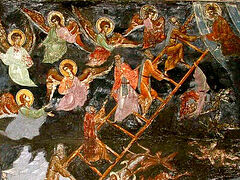The virtues of humility, spiritual, weeping and love of Truth. (The first, second, and fourth Commandments of Beatitude, according to the Holy Gospel by Mathew, and their interrelation.)
According to the teachings of the Holy Fathers, ascetics and luminaries of Christian virtue, the first among all the Christian virtues is Humility. This is the virtue without which no other virtue may be acquired and without which Christian spiritual perfection is unthinkable. Christ the Savior begins His Commandments of Beatitudes with the commandment of humility, “Blessed are the poor in spirit: for theirs is the kingdom of heaven.” (Matthew 5:3).
We call those people poor, in the usual sense of the word, who do not possess anything and ordinarily ask others for help. (These poor are not always “blessed”, for among them are thieves, drunkards, and swindlers, etc.) But every Christian (poor and rich) must see himself as poor in spirit, that is, see that he does not have anything good of his own within himself. Any good within us is from God. Whereas, from ourselves, we add only evil, love of self, sensual pleasures and sinful pride. Each one of us must remember this. The Holy Gospel does not pointlessly say, God resisteth the proud but giveth grace unto the humble (James 4:6). As we have already stated, no other virtue is possible without humility, for any virtue not completed in the spirit of humility is done with pride, against God; and the person falls away from God’s blessings.
Next to sincere and deep humility, a Christian must have spiritual weeping, which is spoken of in the second Commandment of Beatitude. Who does not know that humility is often shallow and deceiving in a person? Besides this, it is not without reason that a proverb says, “humility is better than pride”. A person often appears to humble himself. But it turns out to be a superficial, shallow feeling, not a deep, continuous frame of mind and spiritual experience. Our holy fathers-ascetics pointed to one way whereby the sincerity and depth of humility may be found out. Start to reproach and abuse a person for the very sins, for which he “humbly” condemns himself, using the same expressions he would use. If his humility is sincere, he will listen to the censure without anger, and sometimes even be grateful for the humbling explanation. But if he does not have true humility, he will not endure the censure but will become angry because his pride will stand on end.
Our Lord says, Blessed are they that mourn: for they shall be comforted (Mathew 5:4). In other words, blessed are those who are not only sorry for their imperfections but also weep over them.
In this way, the weeping here is understood in the sense of spiritual weeping, a cry over sins and in connection with this, over the separation from the Kingdom of Heaven. Besides this, among the Christian ascetics were many who, while filled with love and commiseration, wept for other people over their sins, failings, and sufferings. It is also, in general, not against the spirit of the Holy Gospel to consider blessed also all those suffering and unfortunate people who accept their suffering in a Christian spirit, humbly and submissively. They are truly blessed for they will be comforted by God’s love. And on the other hand, those who in this earthly life only seek after and endeavor to simply obtain comfort and pleasure are not blessed. Although they consider themselves lucky, and others do so also, according to the spirit of the Holy Gospel’s teachings, they are the unhappiest of people. They are the ones about whom Our Lord warned, Woe unto you that are rich! for ye have received your consolation. Woe unto you that are full! for ye shall hunger. Woe unto you that laugh now! for ye shall mourn and weep (Luke 6:24-25).
When a person is filled with humility and suffering over his sins he can no longer reconcile himself to the evil of the sin that so begrimes him and other people. He strives to leave his sinful corruption and the falseness of his surrounding life for God’s truth, for saintliness and purity. He seeks and desires God’s truth, its triumph over human deceit more than the hungry want to eat or the thirsty to drink. The fourth Commandment of Beatitude speaks about this, in relation to the two first ones: Blessed are they which do hunger and thirst after righteousness: for they shall be filled (Mathew 5:6). When shall they become satiated? Partially in our earthly life when these genuine followers of God’s truth sometimes see the triumph and victory of Truth in God’s Providence and the appearance of God’s justice and might. Their spiritual hunger and thirst will become satiated only in blessed eternity, in a new heaven and a new earth, wherein dwelleth righteousness (2 Peter 3:13).







